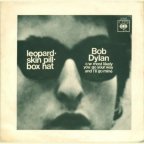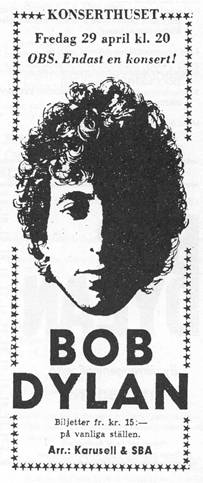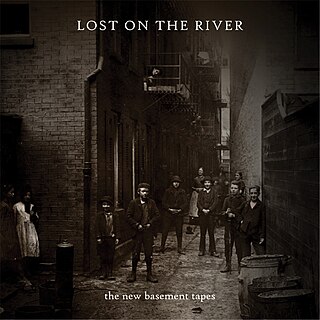"Mr. Tambourine Man" is a song written by Bob Dylan, released as the first track of the acoustic side of his March 1965 album Bringing It All Back Home. The song's popularity led to Dylan recording it live many times, and it has been included in multiple compilation albums. It has been translated into other languages and has been used or referenced in television shows, films, and books.

"Leopard-Skin Pill-Box Hat" is a song by American singer-songwriter Bob Dylan, which was released on the second side of his seventh studio album Blonde on Blonde (1966). The song was written by Dylan, and produced by Bob Johnston. Dylan has denied that the song references any specific individual, although critics have speculated that it refers to Edie Sedgwick, who Dylan had spent time with in December 1965.
"Tombstone Blues" is a song by American singer-songwriter Bob Dylan, which was released as the second track on his sixth studio album Highway 61 Revisited (1965). The song was written by Dylan, and produced by Bob Johnston. Critical interpretations of the song have suggested that the song references the Vietnam War and US President Lyndon Baines Johnson.

"Just Like Tom Thumb's Blues" is a song written and performed by Bob Dylan. It was originally recorded on August 2, 1965, and released on the album Highway 61 Revisited. The song was later released on the compilation album Bob Dylan's Greatest Hits Vol. II and as two separate live versions recorded at concerts in 1966: the first of which appeared on the B-side of Dylan's "I Want You" single, with the second being released on The Bootleg Series Vol. 4: Bob Dylan Live 1966, The "Royal Albert Hall" Concert. The song has been covered by many artists, including Gordon Lightfoot, Cat Power, Nina Simone, Barry McGuire, Judy Collins, Frankie Miller, Linda Ronstadt, the Grateful Dead, Neil Young, The Black Crowes, Townes Van Zandt, and Bryan Ferry. Lightfoot's version was recorded only weeks after Dylan's original had been released and reached #3 on the Canadian RPM singles chart.

"Stuck Inside of Mobile with the Memphis Blues Again" is a song by American singer-songwriter Bob Dylan from his seventh studio album, Blonde on Blonde (1966). The song was written by Dylan and produced by Bob Johnston. It has nine verses, each featuring a distinct set of characters and circumstances. All 20 takes of "Stuck Inside of Mobile with the Memphis Blues Again" were recorded in the early hours of February 17, 1966, at Columbia Records's A Studio in Nashville, Tennessee, with the last take selected for the album. This version also appears on Dylan's second compilation album, Bob Dylan's Greatest Hits Vol. II (1971).
"Baby, Let Me Follow You Down" is a traditional folk song popularised in the late 1950s by blues guitarist Eric Von Schmidt. The song is best known for its appearance on Bob Dylan's debut album Bob Dylan.
"It's All Over Now, Baby Blue" is a song written and performed by Bob Dylan and featured on his Bringing It All Back Home album, released on March 22, 1965, by Columbia Records. The song was recorded on January 15, 1965, with Dylan's acoustic guitar and harmonica and William E. Lee's bass guitar the only instrumentation. The lyrics were heavily influenced by Symbolist poetry and bid farewell to the titular "Baby Blue". There has been much speculation about the real life identity of "Baby Blue", with possibilities including Joan Baez, David Blue, Paul Clayton, Dylan's folk music audience, and even Dylan himself.
"She Belongs to Me" is a song by Bob Dylan, and was first released as the second track on his 1965 album Bringing It All Back Home. The song may be about a former girlfriend, Suze Rotolo, or fellow folk singer Joan Baez, contemporary siren Nico, or Sara Lownds, the woman that Dylan would wed in November 1965.

By 1965, Bob Dylan was the leading songwriter of the American folk music revival. The response to his albums The Freewheelin' Bob Dylan and The Times They Are a-Changin' led the media to label him the "spokesman of a generation".
"It Takes a Lot to Laugh, It Takes a Train to Cry" is a song written by Bob Dylan, that was originally released on his album Highway 61 Revisited. It was recorded on July 29, 1965. The song was also included on an early, European Dylan compilation album entitled Bob Dylan's Greatest Hits 2.
"One Too Many Mornings" is a song by Bob Dylan, released on his third studio album The Times They Are a-Changin' in 1964. The chords and vocal melody are in some places very similar to the song "The Times They Are A-Changin'". "One Too Many Mornings" is in the key of C Major and is fingerpicked.
"I Don't Believe You (She Acts Like We Never Have Met)" is a song written and performed by Bob Dylan and released on his fourth studio album Another Side of Bob Dylan in 1964.

The Bob Dylan World Tour 1966 was a concert tour undertaken by American musician Bob Dylan, from February to May 1966. Dylan's 1966 World Tour was notable as the first tour where Dylan employed an electric band backing him, following him "going electric" at the 1965 Newport Folk Festival. The musicians Dylan employed as his backing band were known as the Hawks, who later became famous as the Band.
Tell Me, Momma is a song written by Bob Dylan and performed exclusively during his 1966 World Tour with the Band. It was used to introduce the second half of a concert, when Dylan switched from an acoustic solo performance to an electric performance backed by a band. The song was not recorded on a studio album, nor was it ever performed again by Dylan in concert.
Bob Dylan bootleg recordings are unreleased performances by American singer-songwriter Bob Dylan, that have been circulated throughout the public without undergoing an official, sanctioned release. It is commonly misconceived that bootlegs are only restricted to audio, but bootleg video performances, such as Dylan's 1966 film Eat the Document, which remains officially unreleased, are considered to be bootlegs. Dylan is generally considered to be the most bootlegged artist in rock history, rivaled only by the Grateful Dead.

Lost on the River: The New Basement Tapes is an album produced by T Bone Burnett featuring a collective of musicians recording under the moniker The New Basement Tapes—Elvis Costello, Rhiannon Giddens, Taylor Goldsmith, Jim James and Marcus Mumford.

The Bootleg Series Vol. 12: The Cutting Edge 1965–1966 is a compilation album by American singer-songwriter Bob Dylan, released on Legacy Records in November 2015. The tenth installment in the ongoing Bob Dylan Bootleg Series, it comprises recordings from 1965 and 1966, mostly unreleased demos and outtakes from recording sessions for his albums Bringing It All Back Home, Highway 61 Revisited and Blonde on Blonde. The standard set peaked at #41 on the Billboard 200.

The 1966 Live Recordings is a 36-CD boxset of live recordings from the 1966 Live Tour by Bob Dylan, released on Legacy Records in November 2016. It includes every known recording from the tour, including audience tapes. Most of the set was unreleased at that point and some tapes never circulated before.

The Bootleg Series Vol. 13: Trouble No More 1979–1981 is a set of recordings from 1979 to 1981 by Bob Dylan that showcases the music he wrote and performed during his born-again Christian period, covered in the studio albums Slow Train Coming, Saved and Shot of Love.

Cat Power Sings Dylan: The 1966 Royal Albert Hall Concert is a live album by American singer-songwriter Cat Power, released on November 10, 2023, through Domino Recording Company. It was recorded on November 5, 2022, at the Royal Albert Hall in London, with Cat Power recreating Bob Dylan's show at the Manchester Free Trade Hall in May 1966, which was bootlegged and mistakenly labeled as having been recorded at the Royal Albert Hall. It received positive reviews from critics.










